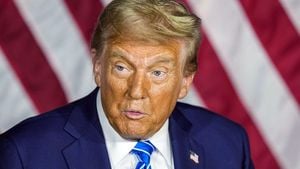With Donald Trump’s re-election now confirmed after his victory speech on November 6, 2024, the political climate surrounding the war in Ukraine is braced for significant shifts. Ukrainians, who have heavily relied on the United States for military and financial support since Russia's invasion began, are filled with mixed feelings ranging from concern to grim resolve as they anticipate what Trump's administration might mean for their country's defense against Russian aggression.
Throughout his campaign, Trump has repeatedly echoed skepticism over U.S. assistance to Ukraine, questioning the wisdom of continuing to funnel resources at current levels. His comments have raised alarms among Ukrainian officials who fear the U.S. could reduce its commitment to Kyiv during what has already become a grueling conflict, leading to possible severe repercussions on the battlefield.
Trump's running mate, JD Vance, echoed similar sentiments, indicating reluctance on the part of the Republican leadership to maintain unwavering support for Ukraine as seen during the Biden administration. Such remarks suggest Trump might even push for negotiations between Ukraine and Russia, potentially compelling Ukraine to accept less favorable terms, which could threaten their territorial integrity.
Key among the crises faced by Ukraine is the dire situation on the ground. Over recent months, Russian forces have intensified their advances, especially within the eastern Donbas region. This development compels Ukraine to reconsider its military strategies whilst grappling with the changing tides of support from its allies. Reports detail growing unease within Ukraine’s armed forces, particularly as they have been forced to make tough tactical decisions due to dwindling personnel and resources.
Several military experts believe the looming transition of power may weaken Ukraine's bargaining position dramatically. According to Stephen Walt, a leading scholar of international relations, Trump's ascent could mean tougher negotiations for Ukraine. With significant U.S. aid already positioned to flow under Biden’s administration, Trump’s administration may push for cuts or at least maneuver for more stringent terms for any military support.
President Volodymyr Zelenskyy was previously known for cultivating bipartisan support for Ukraine within the U.S., but now faces major challenges. While he congratulated Trump for his electoral win and reiterated the importance of maintaining strong ties between the two nations, there is hesitation within Kyiv. Zelensky remarked on how he appreciated Trump’s commitment toward achieving “peace through strength,” yet ominously highlighted the dependency of Ukraine on bipartisan consensus from Washington for continued aid.
Experts caution against overly optimistic assessments of Trump's intentions. Political analysts note Trump’s past admiration for Russian President Vladimir Putin and his often dismissive stance toward Ukraine. Given his past and current rhetoric declaring he could end the conflict within 24 hours, they wonder what those peace efforts might entail. How much will he pressure Ukraine to concede territory or come to terms with Moscow’s terms?
Analysts suggest the challenge lies not just with the president-elect's approach but also with the broader ambitions of Russia. Newly reported information indicates Russia has begun reinforcing its military presence with strategic alliances, including draws from North Korea. The potential influx of North Korean troops on the fields could shift the dynamic entirely, making it increasingly difficult for Ukrainian forces to hold the lines against sustained assaults.
The urgency for Ukraine is palpable, and Euro-Atlantic partners recognize the pressing need to stabilize the European front. A re-evaluated policy under Trump may mean increased responsibilities for NATO allies on how they support Ukraine against external threats. With concerns mounting, military analysts predict Ukraine might shift its focus toward strengthening collaborative operations with its European allies.
Still, not all experts lean toward pessimism. Some, like Kori Schake from the American Enterprise Institute, argue Trump might still provide substantial military assistance as he aims to eliminate Russian influence. This sentiment emerges from the belief Trump wishes to establish himself as the decisive leader who enhances not only U.S. standing but also furthers Ukraine’s fight against invasion.
This raises fundamental questions: How will Trump’s erratic foreign policies manifest? Will he prioritize U.S. interests unequivocally, tuning down promises to negotiate harshly with Russia? Or will he allow the swift momentum gained by Russia to dictate the parameters of any peace settlement?
Already, the war waged by Russia has spurred debates among military circles about the sustainability of Ukraine’s position without continued U.S. support. Russian advances are considerable, and with terrain holding severe strategic value for both Kyiv and Moscow, the current momentum favors Russian forces across multiple fronts.
The political reality under Trump sends ripples through policymakers and military advisors alike. An uncertain path lies before them, with analysts expressing concern over whether Ukraine will be compelled to compromise or if it can maintain international support through significant geopolitical maneuvering. The potential cut of resources could spell disaster for Ukraine’s defense strategy just as the war takes on greater significance amid rising hardships.
Ukraine's political and military leadership know they must brace for more enormous transitions and prepare for either the possibility of losing major support or pivoting their approach to align closely with the new U.S. administration's priorities. The stakes are undeniably high, and for Ukrainians risking lives on the battlefield, the dawn of Trump's influence feels like both an uncertain era and one tinged with foreboding.
A reshaping of U.S.-Ukraine relations might put not just the latter’s sovereignty at risk, but also the broader framework of security across Europe and the West. What lies beyond the horizon will likely be shaped by Trump's approach to leverage power dynamics against Russia, as well as the diverse ambitions of cold war-like allegiances formed amid this turbulent period. Will Trump forge positive strategic partnerships with Ukraine, or will he dictate precarious pathways to peace without considering Kyiv’s strategic interests? Only time will reveal if his manner of governance stands resilient or falters amid the chaos of global conflict.



